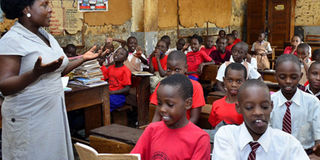Pupils excel in local languages, fail English

Studying. A teacher conducts a lesson at Buganda Road Primary School in Kampala last month. FILE PHOTO
What you need to know:
- Education State minister Rosemary Sseninde criticised teachers for training learners for only passing exams instead of equipping them with interpersonal, critical and vocational skills.
Kampala. The Uganda National Examinations Board (Uneb) yesterday reported a slight improvement in literacy competence of lower level pupils in using local languages but their performance remained poor in the English language.
The findings, for instance, show that Ateso speakers scored 89.4 per cent in listening assessment in 2017, up from 87 per cent in 2016. But when the same children were subjected to questions in the English language, they scored only 25.2 per cent, far below average.
The Uneb Early Grading assessment examined 11 local languages, namely Ateso, Leb-Acoli, Leb-Lango, Lhukonzo, Luganda, Lugbarati, Lumasaaba, Lusoga, Ngakarimojong, Runyankore-Rukiga and Runyoro-Rutoro.
“There has been a slight improvement and much as it is below 50 per cent, we must celebrate it. Our children fail exams because they cannot read and understand the question. The books are there [in schools] where we went, but they must be in the hands of the learners,” Mr Sserunkuma Bbosa, a Uneb official, said at the release of the findings in Kampala yesterday.
The Uneb assessment was done last year in 27 districts involving 405 public primary schools. Primary One, Two and Three pupils were sampled from 15 schools from each of the sampled district and subjected to oral and individual assessment in both local language as a medium of instruction and English language.
Ms Caroline Kavuma, an Early Grade Reading technical advisor with the ministry of Education, urged parents to get involved in the education of their children irrespective of whether they had attended school or not.
She said even an illiterate parent can still offer an audience to their children as they read out to them or support them in storytelling to improve their listening and speaking skills.
Ms Kavuma stressed the importance of learning the local language as the foundation of culture, thought processing, and learning other languages.
“We need to pass on values that are ours. We cannot pass on values in a language that is not ours. Some of the postures of sitting and walking are not in our African culture,” she said.
“I encourage Africans to love who we are; let’s come back to the roots. The reception years must teach children to identify who they are. Our children can’t pass English either because they have not mastered the local language,” Ms Caroline Kavuma added.
However, Ms Sarah Natunga, the curriculum specialist with National Curriculum Development Centre (NCDC), questioned why the researchers never involved them in the assessment.
“Early grade reading was started from NCDC as the key developers of the curriculum and developers of support materials. My concern is about NCDC not appearing anywhere at all. NCDC should spearhead everything. You can’t roll out Early Grade Reading model to any district without NCDC because we have to give you materials. I hope it was an oversight. NCDC should appear in every assessment,” Ms Natunga said.
But Mr Amos Opaman, the Uneb lead researcher, defended the board saying they had invited their counterparts from NCDC but none showed up.
Education State minister Rosemary Sseninde said the early grade reading intervention should be integrated into the primary teachers’ curriculum so that the teachers graduate when they have mastered reading skills.
“People don’t want to read, they are not taught how to read and there is no interest. In the early days, there was no such programme, how come we were taught well. Maybe there is something which has gone wrong. In my opinion, something has to be done in the teachers’ training colleges,” Ms Seninde said.




